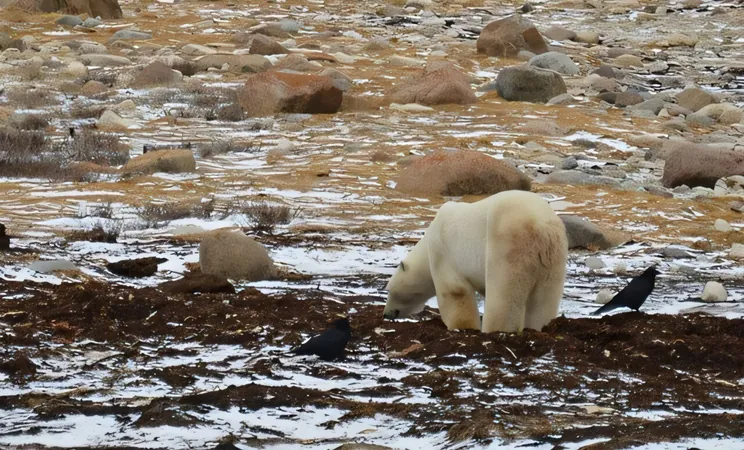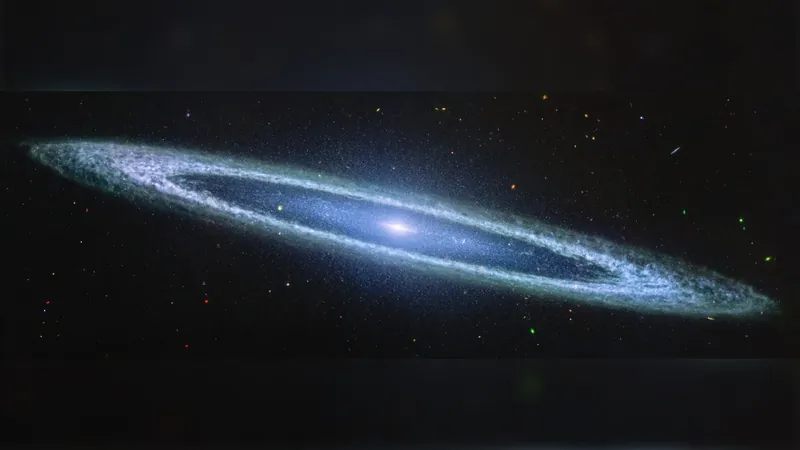
The Surprising Secrets Hidden in Polar Bear Poop: What They Revealed About the Future of This Iconic Species
2024-12-02
Author: Michael
Introduction
As scientists venture into the harsh terrain of Churchill, Manitoba, infamous for its dense population of polar bears, they prepare for a unique research project that may hold the key to understanding the future of these majestic and vulnerable creatures. Dr. Stephanie Collins and Ph.D. student Jing Lu are at the forefront of an investigation that intertwines the fate of polar bears with the alarming impacts of climate change.
Imagine enjoying a meal while a curious polar bear peers back at you—this is just a typical day in the "Capital of Polar Bears." The region’s immense natural beauty and perilous wildlife offer a rare window into the complex lives of these iconic animals, but it is their poop that might just unveil critical insights.
Digging Into Bear Poop for Clues
In November 2018, Dr. Collins and Lu embarked on a daring mission to collect and analyze the fecal microbiomes of both captive and wild polar bears. This study aims to unlock the intricate relationship between a bear’s diet, gut health, and survival in an ever-changing Arctic landscape. Their meta-safari involved not only spotting bear droppings across fields under the vigilant watch of experienced locals but also combing coastal areas for seaweed samples to supplement the diets of captive bears at the Cochrane Polar Bear Habitat.
These bears are being fed a carefully curated, protein-rich diet of mackerel and ocean vegetation, simulating potential shifts in their food sources as climate change dramatically alters their natural habitat.
The Shocking Dietary Shifts Facing Polar Bears
The consequences of shrinking Arctic sea ice cannot be overstated. With extended ice-free seasons, polar bears find themselves increasingly confined to land, drastically changing their hunting patterns. Historically reliant on fat-rich seal diets, these bears may be forced to adapt to a lower-fat diet characterized by terrestrial animals, significantly impacting their gut microbiome—a crucial component of their overall health.
Results from this groundbreaking study, recently published in the esteemed journal PLOS ONE, reveal that captive bears, accustomed to a stable, high-protein diet, displayed a more diverse fecal microbiome compared to their wild counterparts. This stark contrast suggests that wild bears struggling to adapt to new dietary conditions may face serious health implications, raising concerns about their survival as climate changes accelerate.
Facing an Uncertain Future
It’s alarmingly clear: the polar bears that roam the ice today could become a shadow of their former selves if they are forced into prolonged dependence on terrestrial food sources.
“Polar bears are increasingly vulnerable due to climate change,” warns Lu. “Their survival hinges on the presence of ice, which plays a vital role in their feeding, movement, and reproduction.” Should the ice continue to vanish, the very essence of what makes a polar bear—its dietary preferences, gut health, and adaptability—could dramatically evolve, forever altering the species.
Hope Amidst Despair
While the study paints a grim picture of polar bears' future, it also offers a glimmer of hope. If these remarkable animals can adapt to their changing circumstances, their evolutionary journey may establish a new paradigm for survival in our warming world. Yet, the path ahead is fraught with danger—a race against time that remains perilously dependent on the health of our planet.
As we continue to study these fascinating animals, we must also strive to protect their fragile habitat. The fate of polar bears hangs in the balance, and those tiny secrets found in their poop could transform our understanding of resilience in the face of climate change. Will we act swiftly enough to shield these beloved giants from the consequences of our actions, or will they be forced to adapt in ways we can't even imagine? Only time will tell.









 Brasil (PT)
Brasil (PT)
 Canada (EN)
Canada (EN)
 Chile (ES)
Chile (ES)
 España (ES)
España (ES)
 France (FR)
France (FR)
 Hong Kong (EN)
Hong Kong (EN)
 Italia (IT)
Italia (IT)
 日本 (JA)
日本 (JA)
 Magyarország (HU)
Magyarország (HU)
 Norge (NO)
Norge (NO)
 Polska (PL)
Polska (PL)
 Schweiz (DE)
Schweiz (DE)
 Singapore (EN)
Singapore (EN)
 Sverige (SV)
Sverige (SV)
 Suomi (FI)
Suomi (FI)
 Türkiye (TR)
Türkiye (TR)